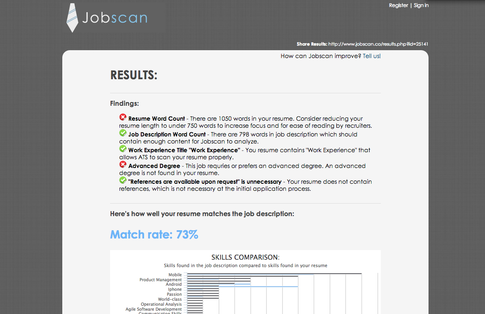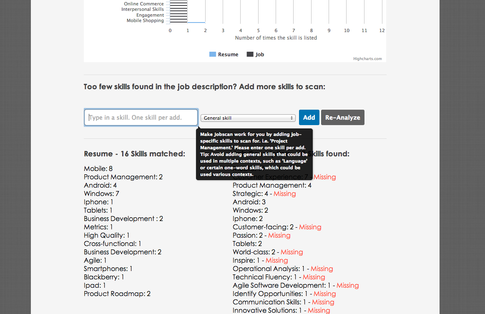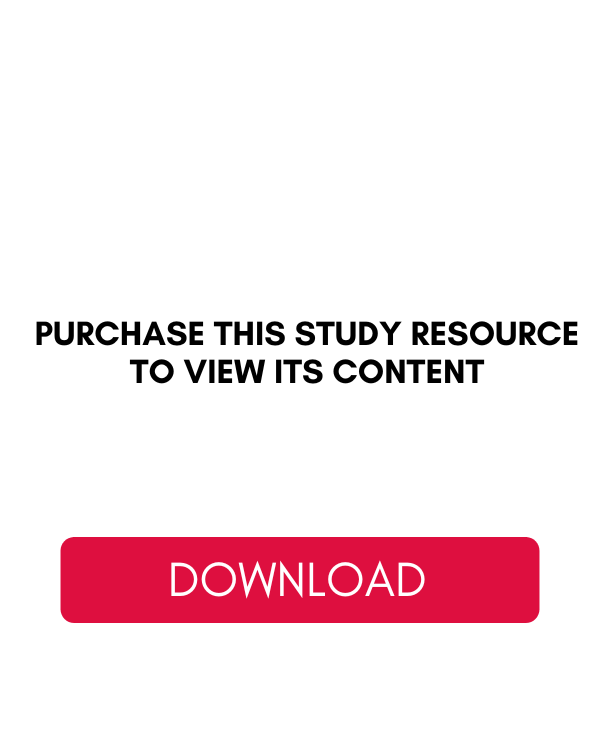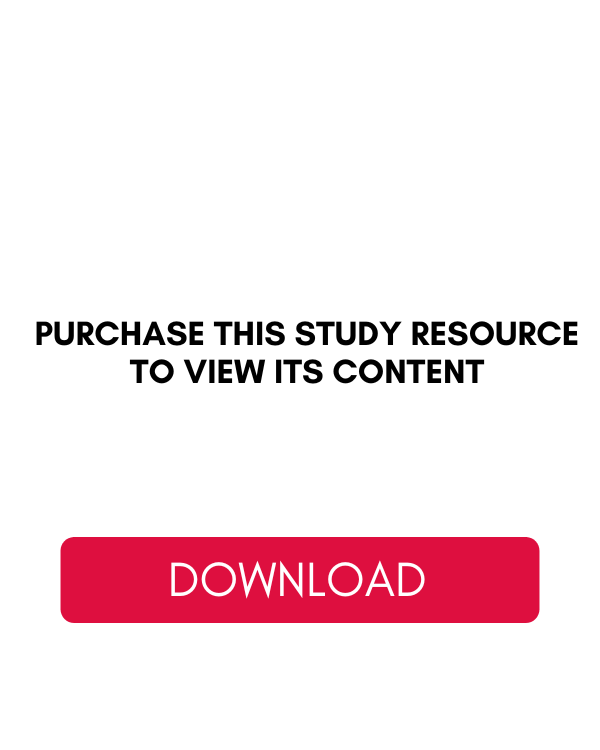Pass the recruiters screening process requisite educational level
Recruiting: What do recruiters look for in a resumé at first glance?FAQ
When recruiters look through a stack of resumes for candidate screening, what is the vital information they focus on?
Overall experience - Is there a career progression? Do they have increasing levels of responsibility? Do the titles make sense? Do the responsibilities listed therein match what I'm looking for.
Keyword search - Do they have the specific experience for the role I'm hiring for? I Command + F the crap out of resumes. On any given day I'm searching for things like Ruby on Rails, Mule, Business Intelligence, MBA, Consulting, POS, Cisco, Javascript, and seriously, anything you can think of.
Total time it takes me to do all of above: < 30 seconds*
*Note: I will likely later read the resume far more in depth, but
only if I already know I like the candidate. It takes me less than a
minute to fully digest a resume and flag that person for follow up. I
read a resume pretty thoroughly once I know I will be speaking to that
person on the phone. But I will not thoroughly read a resume of someone
who did not pass the above categories.
Things I rarely pay attention to:
Things I wish more people would do:
Bring personality into the resume -- We recruiters are staring at these missives all day long. Throw a joke in there somewhere for goodness sake. Talk about how much you love Nutella (I have this in my own personal resume). If you're a rockstar, throw some cheeky self-deprecation in there if you can do so elegantly. I think it's important to keep the work experience details as professional as possible, but trust me, there are ways to have fun with it. I love an easter egg buried in a resume...figureatively speaking.
Using MS Word's resume templates -- Period.
Writing resumes in first person -- Exceptions made for people who do it cleverly.
Sending resumes addressed to the CEO that end up on my desk unopened - This is a gross generalization here and exceptions are made for smaller companies, but um, CEOs don't read resumes -- not the first pass. Also see above re: paper resumes. P.S. We laugh at people who do this.
Exaggerating titles and responsibilities -- Eventually the truth comes out.
Here's an eye tracking study by Ladders that offers more insight. I've worked with hundreds of recruiters at startups and large companies. Some observations:
No body wants to read your resume. The fact that a recruiter opened your resume means that there was something interesting in your resume (a keyword, previous company, etc.). They just want to quickly see what that was and move on. So, keep it short and simple with a focus on your accomplishments, not activities.
Due to rising competition in today's job market, 90% of
companies (larger than 1,000 employees) use Application
Tracking Systems in order to help them search for qualified
candidates from a large pool of applicants. ATS (Google
"Applicant Tracking System") help employers by analyzing
applicants' resumes and identifying those whose content match given sets
of keywords.
Here are sneak peeks into Applicant Tracking System and how you are
viewed in these systems.


It doesn't matter what they look at
Resumes are not a reliable way of determining if you are worth
interviewing, let alone hiring.
The #1 factor in your resume is your spelling and grammar, not any of
the content. (Lessons
from a year's worth of hiring data)
It turns out that recruiters, hiring managers, and interviewers only do
slightly better than 50/50 when trying to figure out if they should
interview someone just by looking at a resume.
Check out this talk by Aline Lerner on her
research into this phenomenon:
Technical
Recruiting Best Practices
include an objective/profile section that is really particular to you, and doesn't just use fancy and meaningless terms
always aim for 1 page, but 2 is ok if absolutely necessary
Recently had to review 130 CV's for my client, to help them find my
replacement (this happens often, part of my job).
As they had already been through HR, they all had met the job
description to some degree or another. I considered the special attitude
required to succeed in this role (its a very difficult environment,
needs incredible organisation skills, and a personable attitude), and
looked for that.
I looked for people who
a) Weren't incredibly overqualified - we had people apply with 10+ more
years experience than necessary and wanting a salary to match.
b) Weren't terribly underqualified - lots of the work requires the
person to tap into experience in dealing with people/teams in the past
to resolve issues. Someone who has spent their short career in a
different area with little human interaction is not a fit.
c) People who had a personality shine through, or who kept it short and
sweet (made me want more) or who actually told me why they wanted the
job. This is the resume x factor for me. Somehow, you gotta give the
impression that you value my time, you aren't going to muck me around by
talking for 3 hours (i.e 5 page resumes), and you can communicate in a
business context with a bit of personality.
Those are the people I short listed. It's unfortunate I don't get to
interview them. IMO, Lena
Bednarikova has an incredible take on hiring - we can only hope
the rest of the business world catches on. I see hiring in large firms
done by teams/committee and no one is ever good enough and when they
are, they already have the stain of 'newbie' by the team. We need to
hire for the culture we want, not the culture we already have and to do
that, managers need to take the reins back and take control of the
process.
As others have said, it depends upon the type of role, but a lot also
depends on the volume of applications - assuming I'm not working on a
headhunting assignment, I may get 400+ applications for a particular
vacancy, so it's as much a deselection as opposed to a
selection process. A good percentage of applicants will be deselected
before their CV is even opened based on what's stated on their email
covering letter, after this it's spelling mistakes, location / work
permit requirements, a brief glance at the most recent couple of year's
experience to see if there's some vague relevance to the role I'm
recruiting for etc. This takes 5, 10 seconds max. This tends to clear
around 80 - 90% of applications for some roles.
Only then will I start to look at a CV in detail. Of course, if I only
have half a dozen potential candidates then the approach may be slightly
different...
What mistakes you are making that will land your resume in a
trash can!
So you are a smart, intelligent, talented person with great credentials,
qualifications and you are a star performer at your company but when it
comes to the cut throat job market, you just don't get the calls. You
have a resume and you forward it to several people but clearly no one
seems to be interested in you and you don't seem to understand why? All
the matter in there is simply brilliant then why wouldn't people call
you? Then you see people with lesser credentials scoring job offers left
right and centre. What are they doing that you're not? You know what you
are, you are that great looking amazing person who is not photogenic and
you cannot write anything good on a dating profile. That fat person, who
is a Photoshop expert and who knows how to make a great profile will
always do better than you at the dating site. Sorry to break it to you
but the world is a superficial place and you need to learn to sell
yourself.
I know exactly what you are thinking. “Destroy” is a very strong word
to use when talking about something like resume mistakes. Well, you are
right. But that doesn’t make it any less accurate. In today’s job
market, making just one error on your resume could very easily ruin your
chances at a job that you may actually be a great candidate for.
With the amount of time you could spend looking for the right jobs to
apply for, avoiding the following common mistakes is vital.
1. A Confusing or Ugly Format.
So you’re thinking to yourself, “It’s not the presentation that matters.
It’s the content, right?” While the logical answer to that questions
might be “yes,” the real world answer is “no.” It may strike you as
strange, but a visually appealing resume format can often be the thing
that gets your resume read in the first place. Think about it like this:
if you had a huge stack of resumes on your desk, would you be more
likely to pick up the easy-to-read, well-formatted one, or the confusing
one? Exactly! A good rule to work by is to create your resume in
sections, keeping the information clean and organized. No confusing
formats, no fancy borders, no fonts below 10 point. Just keep it
simple!
2. Grammatical Errors and Typos.
Nothing will destroy your chances at an interview faster than a typo or
grammatical error on your resume or cover letter. Most hiring managers
will stop reading as soon as they reach one of these ugly little
mistakes. Not only does it show your lack of written communication
skills, it also tells them that you don’t really care about the job. So
before sending in that job application, make sure to have a couple
people proofread your resume for mistakes.
But when it comes to your resume, I think any recruiter would like to skim your resume for the following:
Have you got the skills, expertise and experience to perform the job?
Consider first what you are looking for in a job.
Hudson’s
“2015 The Hiring Report” surveyed more than 3000 professionals
and hiring managers across Australia. They found that jobseekers, in
2015, are looking for:
Top 9:
1. Work life
balance
70%
2. Higher
salary
67%
3. Cultural fit within organisation and/or team 64%
4. Career progression/training opportunities 58%
5. Better
benefits
46%
6. A company whose values are closer to mine 36%
7. Strong
manager
30%
8. Better
brand
14%
9. Better job
title
13%
Source: Hudson
It’s important that you consider what is important for you in a new
position and look for an employer that fits these criteria.
While online job boards are still the most important method to find new
talent and a new position, the last 2 years have seen nearly one-third
(28%) of HR managers stating that they are finding these job boards less
effective than 2 years ago.
Instead, the report found that employers are now utilising a
multi-faceted strategy to engage top talent and are using recruitment
specialists (34%), making use of personal networking (31%), accessing
internal recruitment and referral systems (27%) and around 20% are
headhunting already engaged talent. For Business Insider’s article about
the latest Hudson report, click
here.
Finding a new job can be extremely time consuming and requires that you
plan and focus as much as you would when already engaged in your dream
role. By putting in the effort and being totally motivated to achieving
your ideal position, you will increase your chances of success. As Roberta
Matuson says, “there is no such thing as a vacation when job
hunting”.
It is important to have a clear idea of your career path and direction
and you must be able to articulate this to your employer.
Here are a few tips to maximise your opportunity in securing that dream
job!
1. Update your resume. Make sure your resume looks professional,
clean and is very up to date. Read this article for more tips on writing
a winning resume.
2. Nurture your references. Time passes very quickly and, as Cindy
Molchany says, you don’t want to find that a referee doesn’t
remember you well. Turn your references into “career allies” by staying
in touch and keeping them updated about your recent career moves.
3. Create a list of the top 10 – 20 employers that you would like to
work with and do some research into what they do and how they
hire.
4. Find out who you know in the industry or organisation and see if
they can assist with providing a referral or recommendation. Request
that they send your CV to their hiring manager or they may even be able
to give you contact details for the relevant person so that you can
contact them personally. A recent article by Time shows
that many top positions are only advertised internally or are very
limited and not open to the public. Without an inside contact or a
connection with a recruiter who knows the company, your chances of
getting a foot in the door are much lower.
5. Raise your public
profile through smart use of social media sites like LinkedIn
and be active in professional organisations and forums. What does your
online presence say about you? Do a Google search for your name (also
name + industry/job) and consider whether you would be impressed if you
were an employer.
6. Use LinkedIn for Job Hunting: LinkedIn is a great resource for
finding new employment. It’s an excellent source for both direct company
job ads as well as those from recruiters and can supplement traditional
job boards and advertisements.
7. Use Twitter hashtags for your city (or the area you want to work)
and combine it with keywords that relate to your experience or skills,
e.g. #Sydney #ITjobs can result in a list of recent job ads. Follow
Twitter accounts of any recruitment agencies that work specifically in
your chosen field.
8. Consider engaging an experienced specialist
recruitment consultantand/or agency to help you with an
introduction to the right people in these companies. A specialist
recruitment consultant will very often have direct contacts with
businesses and are more likely to be able to introduce you directly to
the appropriate contacts and managers within your target organisations.
It is the recruiter’s job to connect you with appropriate
employers.
9. Ensure you stay focused when searching for jobs and set search
filters so that you remain within your specific skill set. You don’t
want a hiring manager to think you don’t have a clear understanding of
your capabilities and experience.
10. Use job boards: focus your job
search on your specific field of expertise. Don’t apply for
jobs outside your skillset as you probably won’t receive a reply. With
mainstream job boards you are able to search using keywords that are
likely to be used in the advertisement. Using keywords in your search
will mean you can find more relevant jobs. When looking for a major job
board in Australia, check out: SEEK, MyCareer as well as niche job
boards for particular industries.
11. It is worth considering a temp
job, part time or contract positions also. These jobs can be a
great way to update your skills, stay in work and can be a stepping
stone to a permanent, full time position. This can be particularly
useful if you have been out of work for a while or re-entering the
workforce.
12. A survey by Careerbuilder found
that seventy one percent of respondents claimed that EQ is more
important than IQ when it comes to recruitment decisions. Anny
Gordon says that this means it’s important to start working on
and improving your soft skills and EQ. She recommends including these
skills on your resume and when being interviewed. The 5 soft skills
identified by the NACE (National
Association of Colleges and Employers) study are:
· Skills to Perform in a Team Structure
· Excellent Decision and Problem Solving Skills
· Good Communication Skills for Verbally Interacting with Others
Outside and Inside the Business
· Ability to Prioritise, Plan and Organise Work
· Skills to Acquire and Process Information
Finding a new job is challenging but it will be made easier if you
follow the 12 tips above.
Check out some of my otherblog
posts for more information to help in your job search
efforts.
Good luck in 2015!
The C.V. is probably the most disadvantageous document that anyone could use to introduce themselves.
It is also a highly ineffective document to try to initially determine / shortlist whether someone will be appropriate or perform well in the required position.
Remember, you don’t have to conform with the rest and I am speaking
to the recruiters here too.
So it would be remiss of me here to just call out the C.V. without
offering alternatives and there are many.
If you are job seeker or recruiter I would start with this article on
LinkedIn:
The three things top recruiters do.
https://www.linkedin.com/pulse/20141125183045-1816655-three-things-top-recruiters-do?trk=prof-post
Then if you are further interested, I would not only read this
article Page
on linkedin.com, but I would do some further investigation into
these three brilliant alternatives that are changing the way recruitment
is being approached and people are finding meaningful work.
To all who are really seeking, I wish you the absolute very best in your
journey!
At first glance, recruiters will judge a resume based on your total
number of employers, whether you advanced within each company, and the
general aesthetic of your resume.
For a detailed guide into what recruiters look for in their initial
screening of a resume, read executive search expert, Fred Clayton's
blog post:
Your resume has only five seconds to make a first impression!
http://berkhemerclayton.wordpres...
And to learn what recruiters look for in an in-depth assessment of a
resume, read part 2:
What’s next after you pass the five-second resume screening?
http://berkhemerclayton.wordpres...
Wow, Ambra Benjamin's advice is so corporate - it is an incredible
reminder of why I would never fit in as a corporate recruiter.
The constant quest for cookie cutter applications would make me hate my
job due to sheer boredom. Being a 'company snob' would make me
prioritize other corporate employees and pay less attention to potential
stars coming from startups, mid sized businesses or overseas companies
even. Not reading cover letters? Essentially I would have zero interest
as to what drives the applicant to apply to me, my company, the position
I am advertising. Photos causing discomfort? Let's dismiss all of these
European applicants with their habits that don't fit into our
prefabricated boxes. The list was long and it showed the incredible gap
between a corporate recruiter and one that recruits for SMBs.
Great answers.
Few relevant links:
Why
Resumes are a Fresher’s Nightmare
4
Alternatives to Resumes
Excellent time management skills
Strong oral/written communication skills
Don't be afraid to be you if you were big enough to be ok with being you.
I just wrote a blog post on this and hope it'll be useful ;) 10 tips to get pass resume screening for College Grads
As for me, I would like to focus on:
1. Latest Position or Role
This will help me determine the direction the applicant is trying to
take.
2. Experience
I'm interested on the applicant's capability to fill the vacuum and make
a difference.
3. Employment Highlights - What Has He Done to Make Things
Better for the Company?
This can help to let me know that the applicant has problem solving
skills, initiative, resourcefulness, leadership, assertiveness, focus,
and dedication.
In truth, hiring the best can't be based on resumes alone. Resumes are
just a basis of knowing who you want to go the next level in the hiring
process.
If you are looking for an IT job in Australia, a reliable IT recruitment
company can help you find the right one. You must see this now to
check if it works.
To the recruiters/employers specifying preferences for resume length,
formatting, fonts, file formats, etc., why not include this information
on the job listing?
It seems silly to expect job candidates to simply read your
minds.
Personally, I don't see the value prop of a paper resume in this day and
age of multiple public social profiles.
What bothers me about these new algorithm based review methods is
that it's essentially giving favor to people that are gaming the system.
Interviews are even easier to game these days with an equal amount of
information on the web about how to answer interview questions properly
(key here, exaggerate the truth or tell the interviewer what they want
to hear). Unfortunately, once someone is offered a position, you can't
Google your way to answers for a lot of the problems companies need
solved. You see this time and time again with employees of high profile
companies making very poor judgement decisions.
The author is also suggesting an impossible line to walk, don't get
personal or add too much personally but tell me "you like Nutella?"
C'mon, first of all who doesn't like Nutella? And second of all, this is
a pretty boring personal element to mix in.... How does this stand out?
And how does this make you an fun/interesting person?
The resume is dead, try the following:
1. Utilize newer matching and skills assessments websites. For
developers a great one is hackerrrank.com --- HackerRank
2. Another good one for all other jobs is pymetrics.com --- Discover new careers
& companies just by playing neuroscience games.
Best of luck!
Joe Banks, Small business owner, father with a 11yr old son, innovative thinker, entrepr...
When it comes to resume it means a lot of paper work (digital & otherwise). It is that first glance judgment. Reading a resume associates with a number of things – the right timing, urgency of a vacant position, number of applications, and search for a specific requirement. For recruiters sometimes it takes just one glance to get the right profile, and on the other hand it can take a good number of hours to pick out the suitable of all.
As a recruiter, following are a few areas that are read through on the first glance -
Though it goes without saying that resume filtering and
shortlisting is an activity that can be highly differentiated depending
upon a recruiter to recruiter.
Read more about what are the essential differences between
Resume & LinkedIn Profile that one must keep in
mind.
Your
Resume & LinkedIn Profile. The difference you need to
know.
Anonymous
What kind of work you've done. Job-seekers tend to inflate their experience, oversell themselves. We attempt to read through that and see what substance you have.
Format. Format. Format. Poorly-formatted resumes go straight to rejection pile without second consideration. Doc/Docx files that didn't travel well and were printed into something ugly go rejected without second thought.
Surprisingly its the right use of font and size, followed by your
email id. Make sure you have a professional looking email id.
Only then do recruiters start looking at your resume. Make sure you send
across your strongest points in the first 1/3 page in the resume
Keywords : School Name , Previous company Name.
Vivek Ravisankar, Co-founder, interviewstreet.com which helps software companies screen programmers
10 Things Not To Put In Your CV !!

Written 22 Nov, 2012 • View Upvotes
Marcos Mayer, Just when I thought I was out they pull me back in
620 Views
Dimiter Stefanov, Software maniac
1.7k Views
Anonymous
175 Views
Written 3 Feb, 2015 • View Upvotes
586 Views
Written 5 Feb, 2014 • View Upvotes
Kristy Schoenberg, Entrepreneur & People Ops Prof.
315 Views
Written 29 Sep, 2013 • View Upvotes
Karen Chandler Simon • Request Bio
307 Views
Provide more explanation why the answer is correct
Add a topic bio that shows experience or expertise in the topic





